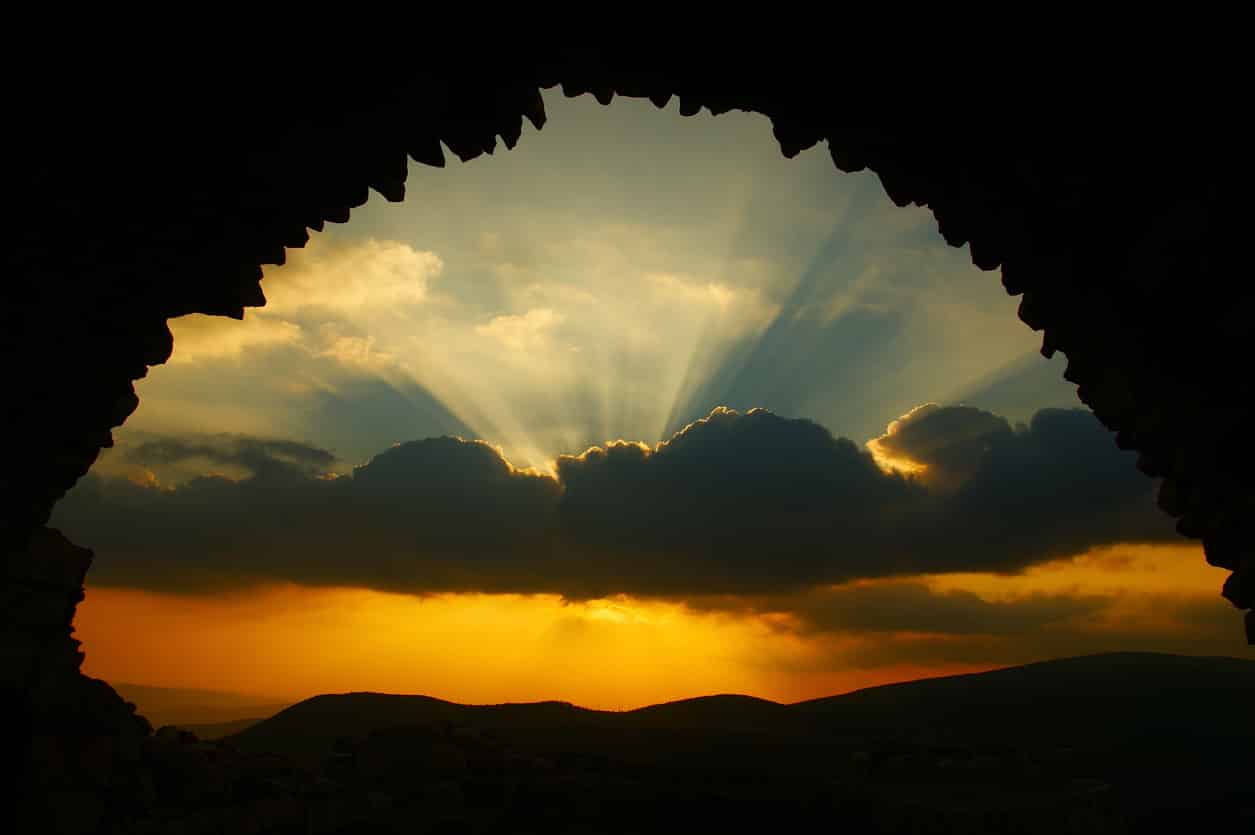Resolving a 3314 Year old Rejection
G-d came from Sinai shone forth to them from Seir [the territory of Esau] and made an appearance from Mount Paran ([Ishmael’s territory]. From the holy myriads, He brought the fire of a religion to them from His right hand. Although there is love for nations, all Your holy ones are in Your hand. They follow Your footsteps and uphold your word.
Opening of Moses’ last words and blessings, Deuteronomy 33:2-3
Picture this scenario:
The world’s nations and religions stand in judgment before G-d. G-d is asking them to account for their activities and for what they perpetrated against the Jewish people and against the world. It is a momentous occasion. The destiny of the world hangs in the balance.
Interesting scenario, huh? If it would only be true, you say.
Well, this is exactly what transpired 3314 years ago, and is being resolved today.
The Talmud (in the opening of the tractate Avodah Zorah) relates in elaborate detail a fascinating account of a dialogue between G-d and the nations.
I would strongly suggest that each of us read this account during the upcoming holiday of Shavuot – as it addresses the events at Sinai – and I assure you that you will find it surprisingly and uncannily relevant to our times.
Here is a brief summary:
The Talmud tells us that our actions are witnesses that testify on our behalf for posterity.
In this context, the Talmud describes a “trial” that will happen in the “future to be” (referring to the Final Redemption of the entire world, a time of peace and harmony, a world where G-d will be at ‘home’ in our material world). G-d will invite all those who served G-d with Torah to “come and receive their reward.” The nations of the world arrive for their reward. First come the two most prestigious and powerful empires the Roman Empire followed by the Persian Empire. Each describe their great achievements in commerce, travel, entertainment, etc., explaining how their contributions allowed for Divine service, and facilitated Jews to study Torah. G-d rejects their arguments, stating that their achievements were for their own sake, not for any higher purpose. “Are there among you those that disseminated Torah?” G-d asks them. G-d concludes that there are none, hence the nations are not deserving of any reward.
The same will transpire with every nation. Each will argue that they should merit reward for their temporal achievements which also benefited the spiritual – from which Israel derived benefit – and their claims will be denied.
“Why are the Romans and Persians explicitly mentioned by name as opposed to the other nations that are not mentioned separately?” The Talmud answers:
“For these regimes will endure until the arrival of Moshiach.”
The Talmud then continues to relate how the nations will attempt to defend themselves against G-d’s charge that they did not involve themselves in Torah. Briefly, the Talmud suggests three different arguments the nations will proffer.
First, that they were never offered the Torah. This is refuted by the fact that the nations were indeed offered the Torah – as it is stated, “G-d came from Sinai shone forth to them from Seir [territory of Esau, father of the Romans] and made an appearance from Mount Paran [land of Ishmael, father of the Persians]” – and they did not accept it.
The second claim would be that since the nations never received the Torah, they were not responsible for it. This too is an unacceptable defense, because in this very contention lies their refutation. For G-d will ask them:
“Why, in fact, did you not accept the Torah in the first place?”
Finally, the nations’ defense will be that G-d did not coerce them to receive the Torah as He did the Jews, implying that had G-d coerced them, they too would have received the Torah and followed its precepts. G-d replies: “The first will inform us” – “Your level of commitment to the first set of commitments – the seven universal Noachide Laws of civilization – will inform us whether you indeed would have observed the Torah had I coerced you to accept it.” “Since you did not fulfill the seven Noachide precepts, it is evident that you would not observe the Torah’s commandments.”
The nations continue to appeal by asking what evidence is there that the Jewish people were meticulous in their observance of Torah. After a series of back and forth arguments, the evidence finally comes from the nations themselves who bear witness to the Jews’ commitment. Nimrod bears witness that Abraham was G-d fearing, Laban bears witness that Jacob was ethical, etc.
Finally, the Talmud concludes that the nations request that G-d give them another chance to accept G-d’s commandments. And G-d gives them the chance. And adds, that it is only through your effort and preparation today that you can merit reward tomorrow. “If you do not prepare food before Shabbat, what will you have to eat?”
The relevance of this narrative today is powerfully evident. We are witnessing today the struggle of nations stemming from Esau – the Roman/Christian/Western world, and Ishmael – the Arab/Muslim world, and their confrontations are deeply related to Israel and the Jews, children of Abraham, Isaac and Jacob.
This struggle can truly be understood only by retracing its roots. The story of Abraham and his children, and then the story of Sinai seven generations later tells us how these battles all began.
G-d offered the Torah to the great nations/religions of the world. The children of Esau and the children of Ishmael rejected it on grounds that they could not comply with some of Torah’s laws.[1] Instead, these people – who encompass all nations – went on to build powerful empires that made important contributions, but also wreaked great destruction on the world.
Their rejection at Sinai is the root of all our conflicts today. Yet the solution lies in the very offer that the nations rejected. Why would G-d offer the nations the Torah surely knowing that they would reject it?[2] The Zohar explains that it was to redeem the Divine ‘sparks’ embedded among the nations. Furthermore, the offer to the nations was actually a way of implanting in them the quality that will ultimately emerge at the end of days when the entire world will serve G-d in unity:
“I will turn to the peoples a pure tongue that all shall call upon the name of G-d and serve Him with one consent.”[2]
G-d’s dialogue with the nations in the “future to be” comes to bring closure to this unresolved 3314 year old rejection. All the material achievements of nations and regimes must be permeated with a higher, Divine purpose. They must pave the way to bring the Divine wisdom and will (Torah) into this world.
How fascinating it is that thousands of years ago Moses, in his final parting words, opens his closing blessing to the people with the vision for the entire world: G-d came from Sinai shone forth to them from Seir and made an appearance from Mount Paran. Moses, 3274 years ago, stated clearly that the Torah would shine forth to all the nations of the world – to the nations of Esau and Ishmael, that encompass all the others.
True, at the time the nations were not yet ready to embrace the Torah’s values. Yet the seeds were planted, and have worked their way and seeped into the fiber of existence everywhere.
That was then. Now, 3314 years later the time has come for these and all nations to face G-d once again, and this time embrace G-d’s law – to reconnect to the commitment of Abraham, “father of all the nations,” that was consummated at Sinai.
As we enter into the holiday of Shavuot, when we celebrate and commemorate the giving of Torah at Sinai 3314 years ago, what more appropriate message is there for each of us and for the world today. We are called upon to declare: Let us make our peace with Sinai.
The nations of the world must and will embrace their legacy — to integrate G-d into their lives, teach G-d’s laws to their children and infuse spirituality into all systems. Jews must fulfill their calling of being a “light unto nations,” bringing Sinai and its teachings to all.
G-d knocked on the door once over three millennia ago. G-d has been waiting ever since. Religions and faiths have been born in the interim and have been going through their growing pains. Some have brought untold devastation to the world. Each has undergone its own ‘market corrections’ and reality checks.
Today, as the nations – especially Esau and Ishmael – confront the world and each other, with Israel as usual in the middle, G-d’s 3314 year knock resonates louder than ever.
Are we listening? Are we responding?
——
1. See also Zohar III 192b. Mechilta Yitro 20:2. Sifri and Rashi Deuteronomy 33:2.
2. See the Tzemach Tzedek, Ohr HaTorah p. 1840, on the verse in Deuteronomy.
3. Zefaniah 3:9. Maimonides. Mishne Torah, Laws of Kings end of chapter 11.








Comments are closed.